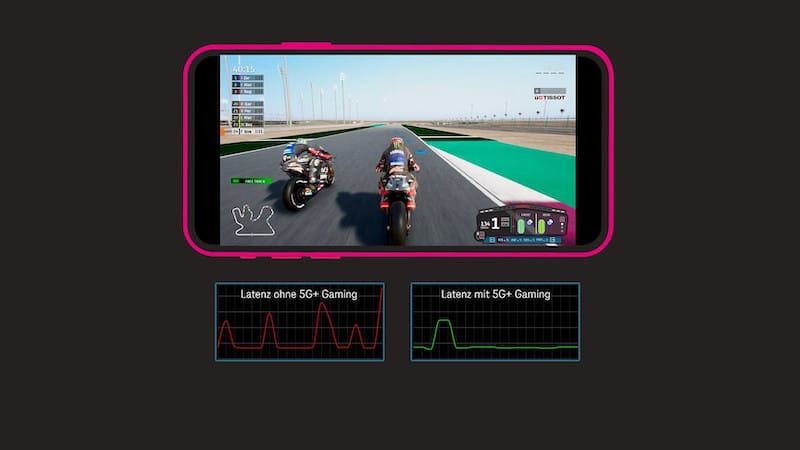
With “5G+ Gaming”, Deutsche Telekom has brought a new tariff option onto the market. It is intended to ensure a smooth and lag-free gaming experience, especially when you are on the go. However, the company may have gained an unauthorized advantage over the competition and undermined net neutrality.
In mid-October 2024, Deutsche Telekom launched a new tariff option with “5G+ Gaming”. From a gamer's perspective, the offer seems tempting at first glance. The company promises “real-time gaming thanks to 5G innovation with particularly stable response times”.
Specifically, this means: 5G+ gaming should ensure a smooth gaming experience without delays – especially when you're on the move. But with its new tariff option, Deutsche Telekom may be undermining network neutrality. And the company even admits this indirectly between the lines.
Gamer and influencer DI1ARAA was happy about this in advance as part of a marketing campaign:
Thanks to 5G+ gaming, I was able to effortlessly navigate my avatar through the game and always stay one step ahead of my opponent.
What is Net Neutrality?
Background information: Since April 30, 2016, certain rules have been in effect within the EU to ensure so-called network neutrality. They are intended to ensure an open Internet and equal access. This applies to both consumers and Internet providers as well as companies.
Specifically, this means: The relevant regulation guarantees users the right to use the Internet the way they want – for example when accessing information or using certain applications or services. The law is also intended to preserve the Internet ecosystem itself.
When it comes to net neutrality, this means that internet providers must treat all data traffic equally. In order to ensure an open Internet, the Federal Network Agency monitors the network neutrality requirements and ensures that they are adhered to.
According to the federal authority, different categories are permitted when it comes to digital traffic management. However, these must be “appropriate”, that is: transparent, non-discriminatory, proportionate and non-commercial. A special traffic category against payment is therefore not permitted.
5G+ Gaming: Is Telekom violating network neutrality?
Against this background, Telekom is treading on thin ice with the “5G+ Gaming” tariff option. According to the Federal Network Agency, there is scope for such so-called “special services”. However, certain requirements apply to network operators. Special services must therefore not replace classic Internet offerings.
Internet providers must objectively demonstrate why data transmission optimization is necessary. The special services must also not endanger the open Internet. However, Telekom relies on so-called “network slicing”. This is a cellular standard within the 5G network.
Network slicing opens up the possibility of physically dividing the network into several levels – for example in the area of a radio cell. Each slice can now have its own settings for bandwidth, latency and other parameters. But that could conflict with net neutrality.
With regard to the 5G+ Gaming tariff option, this means that a new access point is created via the Telekom network – for example on the smartphone. This “slice” is in turn allocated a certain bandwidth. But this higher data transfer rate can be a real advantage for gamers – especially since the LTE network does not support slicing.
Meanwhile, people around Deutsche Telekom are saying that the company is adhering to network neutrality requirements because the bandwidth of other users is not affected. It would not be the first time that Telekom has tested the limits of the EU requirements.
Telekom is testing the limits of EU rules
The company once offered a so-called zero-rating offer called “StreamOn,” which was initially approved subject to conditions. However, the European Court of Justice put a stop to the option in 2021 after years of legal proceedings.
Because: Access to certain online services was not counted towards the monthly data volume with the offer. However, this amounts to unequal treatment of data transfer. At that time, the Federal Network Agency and the Federal Association of Consumer Organizations (vzbv) filed a lawsuit.
This could also happen with a view to the “5G+ Gaming” tariff option. Both the consumer organization and the federal authority want to take a closer look at the offer. When asked, a spokeswoman for the Federal Network Agency told us: “The Federal Network Agency will check Telekom Deutschland's “5G+ Gaming” tariff option for conformity with the network neutrality rules according to Regulation (EU) 2015//2120.”
Meanwhile, vzbv said: “We are aware of the case and we are currently checking Telekom’s new option for legal compliance. We can’t say anything more at this point.”
Telekom: 5G+ gaming could drive up costs
The “5G+ Gaming” offer is based on a partnership between Deutsche Telekom and the cloud gaming provider “Sora Stream”. This means: With the tariff option, titles like Fortnite can be played exclusively with a higher bandwidth.
The problem: Not all providers have the opportunity to participate in such competition. The “5G+ Gaming” tariff option could help larger companies push out smaller ones. This in turn would limit the variety of offers and ultimately increase costs.
But even if the offer were to be banned, Telekom could benefit economically. This was already the case with StreamOn, for example, as the tariff option was able to be offered on the market for several years despite pending legal proceedings.
If future proceedings are not accompanied by severe fines, a calculated breach of the law could even develop into a business model for Deutsche Telekom.
Also interesting:
Source: https://www.basicthinking.de/blog/2024/10/29/5g-gaming-untergraebt-die-telekom-die-netzneutralitaet/


